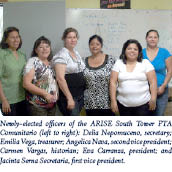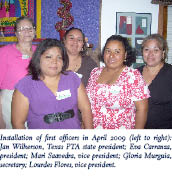• by Aurelio M. Montemayor, M.Ed. • IDRA Newsletter • April 2010 • 
First Anniversary
In the heart of a south Texas colonia, a small wood-frame house with a large back room was the setting of recent elections for the second year of a new PTA model. A year before, in March of 2009, some 20 parents gathered to explore forming their own community-based official PTA unit. Most were fluent only in Spanish, and all were poor. All of the schools their children attended were either academically challenged or feeders to low-achieving secondary schools.
The Founding of a New PTA
At the initial meeting, the parents shared their reasons for wanting a PTA and compared their opinions with those of the National PTA available in Spanish on the web site. They confirmed that their vision was congruent with that of the national organization.
The group elected officers, decided to meet monthly and agreed to be a parent advisory committee for the Texas IDRA Parent Information and Resource Center (PIRC), whose director is also a PTA Comunitario member and an elected member of the national PTA board. In April, the Texas PTA state president officiated at the installation of officers and was the guest of honor at a supper prepared by the parents.
The Ongoing Process
 The monthly meetings of this unique organization are housed and nurtured by ARISE, a grassroots organization established by Sister Gerrie Naughton, a recently-deceased Irish nun who came to south Texas in 1986 to support women’s leadership in poor neighborhoods.
The monthly meetings of this unique organization are housed and nurtured by ARISE, a grassroots organization established by Sister Gerrie Naughton, a recently-deceased Irish nun who came to south Texas in 1986 to support women’s leadership in poor neighborhoods.
ARISE now has four independent centers in some of the neediest colonias (unincorporated small communities), with staff and volunteers who work in their neighborhoods to better the community and support the emerging leadership. The weekly outreach and home visits use the promotora model, a unique method of family involvement.
The Texas IDRA PIRC has been supporting these centers because they are comprised of low-income families with children in Title I schools and are fervent participants in the training and technical assistance provided to parents and parent educators on their roles and responsibilities under the Elementary and Secondary Education Act, currently titled the No Child Left Behind Act.
 ARISE has been a partner for more than a decade in receiving training and carrying out the IDRA model of family leadership in education. ARISE’s development of leadership among the most isolated and poorest of women is congruent with IDRA’s idea of parents becoming leaders and effective advocates for excellent public neighborhood schools.
ARISE has been a partner for more than a decade in receiving training and carrying out the IDRA model of family leadership in education. ARISE’s development of leadership among the most isolated and poorest of women is congruent with IDRA’s idea of parents becoming leaders and effective advocates for excellent public neighborhood schools.
Most of this group’s monthly PTA meetings have included participatory workshops on school accountability, public school choice and supplementary educational services. Conducted mostly in Spanish, each meeting has been continued evidence of the interest, passion, eloquence and energy these families have for the education of their children.
The National and State PTA Connection
The national and Texas state-level PTA have been shifting emphasis for several years. While reaching out to communities that have previously not participated in PTA is on the front burner, fundraising is less of a priority. Without diminishing the honor and respect due to the generations of PTA members who invested so much time and effort, the structure and process must be flexible enough to bring new families into the PTA fold. Participation and membership in PTA has been diminishing, but trends are showing that many families will participate if PTA is congruent with their language, culture and interests. What all families have in common is a deep and fervent interest that their children have an excellent education in a safe and hospitable environment.
The Texas IDRA PIRC Connection
The PIRC’s mandate is to work with families whose children are in Title I schools, emphasizing those not showing adequate academic progress. Federal regulations make no mention of volunteerism or fundraising, but rather give particular attention to parent consultation about such issues as campus parent involvement plans, academic report cards, and compacts (annual agreements) that reflect the expectations and responsibilities of parents, teachers and students.
The PTA Comunitario is a felicitous marriage of local needs for information about the education of children with the priorities of a federally-funded statewide PIRC that is an integral part of IDRA, an independent organization that since 1973 has been advocating for schools that work for all children.
Challenges
Challenges naturally will continue.
-
Parents who are English language learners will continue their development as local PTA officers.
-
Community PTAs are a new phenomenon, quite different in process and style to school-based units and will require some work to be accepted by the larger statewide organization.
-
ARISE is still testing whether or not it wants to keep supporting the PTA model. It took three years for them to agree to have a PTA. When the president of this unit told her niece she had been elected to the position, she exclaimed in Spanish, “Oh auntie, are you going to be out selling cupcakes?”
-
The PIRC support depends on what happens to the federal statues, and no one knows what could change in the coming months and years.
-
Public schools will continue to need support for effective parent engagement.
Celebrating Accomplishments
All challenges aside, we can celebrate, this spring of 2010, that a small group of families in south Texas have an official, dues-paying, card-carrying PTA.
-
They hold monthly, participatory, predominately Spanish, meetings in their community center. Each meeting has a bilingual agenda, minutes, reports on school visits and projects, including an educational workshop.
-
In this first year, this local PTA unit has not had a fundraising event, but members have visited nine of their children’s schools – most which do not have a parent organization.
-
A team from a middle school – a parent involvement specialist, a vice-principal, a counselor and two parents – attended a PTA Comunitario meeting because of the committee’s earlier visit to the school.
-
Every monthly meeting has had visitors from ARISE centers and from other area community organizations.
-
Several other organizations are exploring the establishment of their own community-based PTA.
One new goal is to establish PTAs on their children’s campuses, which is not an insignificant venture considering membership and diversity are national PTA strategic plan goals. For the Title I schools serving these families, this is a gift and an opportunity to meet a key aspect of their Title I parent involvement regulations. ARISE has much to teach schools and PTA about respectful, effective engagement of families who happen to be poor, speak Spanish or are recent immigrants.
While all of IDRA’s Principles for Family Leadership in Education are clearly in evidence in the ARISE South Tower PTA Comunitario, the sixth one seems most obvious: “Families, schools and communities, when drawn together, become a strong, sustainable voice to protect the rights of all children.”
Resources
Montemayor, A.M. “The Lens for Viewing the Full Dimensions of Families,” IDRA Newsletter (San Antonio, Texas: Intercultural Development Research Association, April 2009).
Montemayor, A.M. “IDRA’s Family Leadership Principles,” IDRA Newsletter (San Antonio, Texas: Intercultural Development Research Association, September 2007).
Montemayor, A.M. “E-ruption! Bridging Language and Technology – Educational Leadership Across Generations,” IDRA Newsletter (San Antonio, Texas: Intercultural Development Research Association, March 2006).
Aurelio M. Montemayor, M.Ed., is an IDRA senior education associate and director of the Texas IDRA Parent Information and Resource Center. He also serves on the national board of PTA. Comments and questions may be directed to him via e-mail at feedback@idra.org.
[©2010, IDRA. This article originally appeared in the April 2010 IDRA Newsletter by the Intercultural Development Research Association. Permission to reproduce this article is granted provided the article is reprinted in its entirety and proper credit is given to IDRA and the author.]



